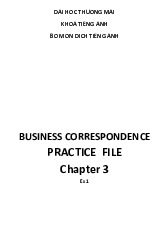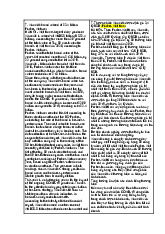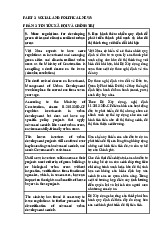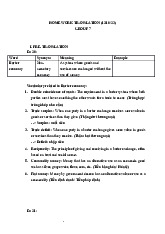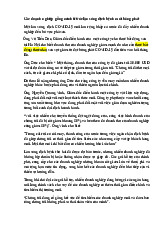



Preview text:
lOMoAR cPSD| 45315597
3. Backward management mechanism is to blame
Some have supposed that if the Hochiminh Stock Exchange (HOSE) were
a private bank, it would quickly correct the technical error which delays
the payment order of customers instead of leaving the problem to last so long.
The overload of stock orders on Vietnam's stock exchange has prolonged
throughout 2020 until the end of the first quarter of this year. The Prime
Minister has given his instruction and the story has been reported by
Reuters, say through the article "Vietnam Stock Market Overloaded by Surge of New Investors."
Some foreign investment funds in Vietnam have voiced their concerns
over this issue. Thomas Hugger, CEO of Asia Frontier Investments, said
it is a worrying issue and HOSE, as a service provider, must ensure the
completely smooth operation of the exchange regardless of a surge in
orders. However, it has not fulfilled this obligation².
After reading some of my articles about this issue on the media, a senior
friend in charge of securities services at one of Vietnam's top securities
companies, "complained," "Don't put all the blame on HOSE. It can only
make a request³, but does not have the authority for approval." An
acquainted journalist also sent me a message which said, "You should
further read the Securities Law to understand the root of the problem."
After some time studying the Securities Law 2019, I can roughly grasp the issue she has hinted at.
An inflexible management model with no cross-supervision and accountability.
In essence, the Ministry of Finance is the highest authority responsible to
the Government for State management of securities and the stock market.
Under the law, the ministry "instructs the State Securities Commission to
implement the strategy, the plan, the project and the policy for stock
market development and regulations for securities and the stock market."
The State Securities Commission (SSC) is an agency under the finance
ministry with the function of "advising" and assisting the Minister of
Finance in State management of securities and the stock market, and
organizing the implementation of laws on securities and the stock market
as assigned and delegated by the finance minister. lOMoAR cPSD| 45315597
What attracts my attention more is the organization of the stock exchange
and the SSC. Under the Securities Law, "The stock exchange of Vietnam
and its subsidiary are under the management and supervision of the SSC."
More importantly, key personnel of the stock exchange, such as the
chairperson and the general director, are appointed by the Minister of
Finance at the request of the board of directors of the exchange and under
the opinion of the chair of the SSC.
This model completely strips off the required independence of the SSC
from the stock exchange, rendering their mutual supervision fully
nonexistent. In the world's leading stock exchanges like those in the U.S.,
the UK and Europe, the stock exchange is a listed shareholding company,
such as the LSE (London Stock Exchange) in the UK, and the Nasdaq
and the New York Stock Exchange (NYSE) in the U.S. Intercontinental
Exchange, the owner of NYSE, the biggest stock exchange in the U.S.,
co-owns many other exchanges, and one of its main business operations
is to provide services, trading technology and data.
As a listed shareholding company, the stock exchange must operate and
compete under the market principle. It must upgrade its services and
technology to make money and "retain" customers. More importantly, it
must make is own decision over investment in the system and repair of its errors.
If the stock exchange is irresponsible and causes losses for investors, it
will be penalized by the State securities commission. For example, the
Securities and Exchange Commission (SEC), the State securities
commission in the U.S., fined NYSE US$14 million for a trading error
over three and a half hours in 2018. On the contrary, the Nasdaq and the
NYSE have recently sued SEC for alleged abuse of power in its decision
to provide data for the public, those which stock exchanges sell to
professional investors to make money. Earlier, these exchanges have also
sued SEC for its decision to set the cap for their trading fees. The fight
between the SEC and the stock exchanges has existed for long, as the
SEC wants to reduce the power of big exchanges in setting securities and
service prices while the exchanges argue that the SEC's move is the
imposition of a subjective thinking for market development and the abuse
of power and causes unnecessary inefficiency for the market.
The fight between stock exchanges and the State securities commission
creates a cross- supervision mechanism which does not allow any party to
abuse power or hold huge power and at the same time ensures
independence and flexibility in the stock exchanges' decisions for lOMoAR cPSD| 45315597
business and technology renovation. Some supposed that if HOSE were a
private bank in Vietnam, it would quickly correct the error when the
system is out of order causing a delay in the payment order of customers
and would not leave the problem to last so long.
Another important issue is the "same parent" mechanism of the stock
exchange and the SSC makes it difficult for accountability. While power
is in the hand of an administering ministry distant to the market and the
SSC is only an advisory agency but can manage and supervise the stock
exchange, it creates a mechanism with no accountability and independent
management and supervision. Accountability is impossible when one
cannot make an independent decision.
Too small for the international financial hub dream
A management model without a mechanism for accountability is an
umbrella for incapable people but a small coat for people passionate for a
change. With this mechanism, active, ambitious people and those who are
lazy, self-interested are the same. Neither has merit nor fault. So, how to
spur growth? No concern for the overload of stock orders. It's like
nothing can be done to escape the small coat or the umbrella.
This mechanism is the root cause of the prolonged overload of stock
orders on HOSE. It is the accumulation of many issues over the years,
including the appointment of capable people, the management of
technology upgrade and the capacity to handle errors of the system.
Given such a mechanism, it's all the same to employ foreign personnel, as
they can do nothing in a mechanism which is too restrictive to some but
protective to many people concerned.
In observing statements by foreign investors in Vietnam, I found one
interesting remark by Petri Deryng, the founder and operator of PYN
Elite Fund. Deryng likened HOSE to a boy or a college student, which
makes me think of the story of Saint Giong.
Vietnam's ambition to become an international financial hub is like the
dream of a boy who wishes to become Saint Giong overnight but has no
suitable armor and iron horse. To become the saint, he needs an armor fit
to his body and a weapon to fight the enemy. That's not to mention
whether the story is a reality or a legend.
In other words, to become an international financial hub, it needs first to change the mechanism. lOMoAR cPSD| 45315597
(Adapted from https://english.thesaigontimes.vn/81256/backward-
management-mechanism-is-to-blame.html)
